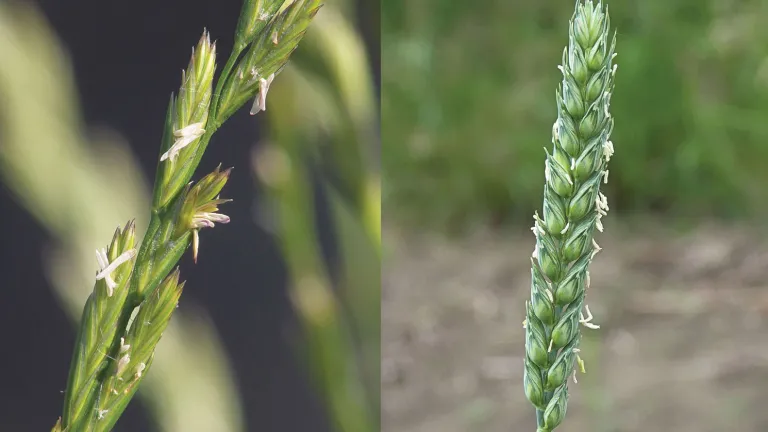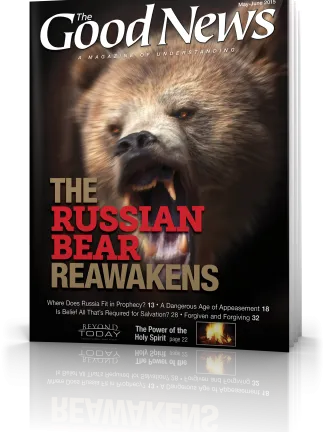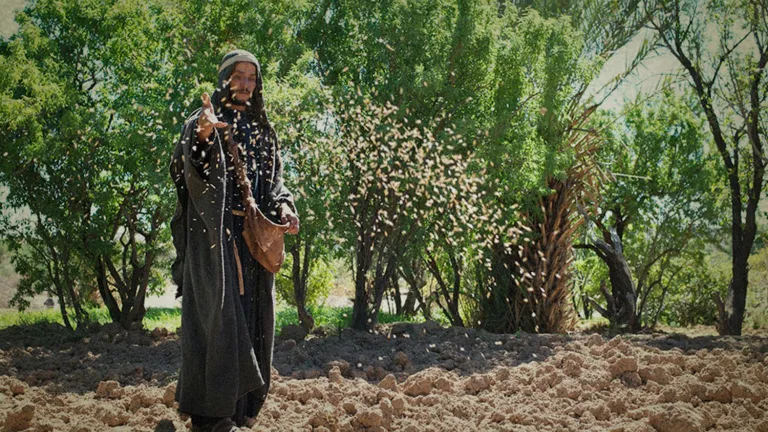Lessons From the Parables: The Parable of the Tares: God's Field

I’ve written about the gardens I used to plant and what I’ve learned through the many seasons and plantings. Let’s consider that God, too, has a garden, a spiritual field—and what our part is in that.
To the church congregation at Corinth the apostle Paul wrote, “You are God’s field, you are God’s building” (1 Corinthians 3:9). Throughout this passage Paul makes it very clear that though he or another minister may have sown seed or tended and watered, it was God who gave the increase. God controls His field and what it produces for harvest (1 Corinthians 3:5-9).
This is both comforting and encouraging. Let me tell you why.
While growing next to wheat, tares cannot be distinguished from the real wheat. It is not until near the time of harvest that you can discern which of the two is the real item.
I’ve been a minister of the gospel for more than 40 years. I’ve pastored the people of God and taught them about the Kingdom. I’ve given thousands of sermons, driven countless thousands of miles to minister. I’ve baptized repentant believers into the Body of Christ, blessed countless children, anointed the sick and buried the faithful. Today I serve a wider audience through a ministry rooted in several forms of media, including this printed page.
This calling has brought me into contact with all kinds of people and personalities. Though they have had many backgrounds and motives and problems in life, one thing brought us together. Our paths crossed on the field called the Church of God. It was in this venue that we talked, walked and experienced the grace of God’s guiding hand.
In 42 years I still believe and teach what I did from the first day in this field, though refined considerably as I’ve learned and come to understand more. Sadly, some of those I’ve known no longer hold to the faith.
As we saw in the parable of the sower and the seed, some allow the seed of the gospel to be choked out by the cares of life and the persecution of the world. Some with whom I once worked fall into this category. With most, I never foresaw that they would fall by the wayside, nor did they. We appeared the same to each other. We professed the same goals and beliefs.
My work in Christ’s ministry has taught me another lesson. It is that even though we are in the fellowship of the same church, it may be for different reasons. The parable of the wheat and the tares adds another dimension to our understanding of seed sown in a field.
Tares among the wheat
Christ gave this parable immediately following the parable of the sower. Notice what He said:
“Another parable He put forth to them, saying: ‘The kingdom of heaven is like a man who sowed good seed in his field; but while men slept, his enemy came and sowed tares among the wheat and went his way. But when the grain had sprouted and produced a crop, then the tares also appeared.
“‘So the servants of the owner came and said to him, “Sir, did you not sow good seed in your field? How then does it have tares?” He said to them, “An enemy has done this.” The servants said to him, “Do you want us then to go and gather them up?”
“‘But he said, “No, lest while you gather up the tares you also uproot the wheat with them. Let both grow together until the harvest, and at the time of harvest I will say to the reapers, ‘First gather together the tares and bind them in bundles to burn them, but gather the wheat into my barn’”’” (Matthew 13:24-30).
This parable is similar to the previous one only in that we have the sowing of seed. But that is where the similarity ends. Every other element holds a different meaning and takes us to a sobering conclusion about God’s field and those who are in it.
A tare is a plant that commonly grows in fields of grain. And although it looks similar to an edible grain, it isn’t suitable for food. In fact, many feel the specific tare, or weed, referred to in this parable is the darnel, a poisonous weed that is very similar in appearance to wheat.
While growing next to the stalk of wheat, darnel cannot be distinguished from the real wheat. It is not until near the time of harvest, when the wheat comes into ear or sprouts its fruit, that you can discern which of the two is the real item.
The parable explained
Notice how Jesus explained this parable:
“He who sows the good seed is the Son of Man. The field is the world, the good seeds are the sons of the kingdom, but the tares are the sons of the wicked one. The enemy who sowed them is the devil, the harvest is the end of the age, and the reapers are the angels. Therefore as the tares are gathered and burned in the fire, so it will be at the end of this age.
“The Son of Man will send out His angels, and they will gather out of His kingdom all things that offend, and those who practice lawlessness, and will cast them into the furnace of fire. There will be wailing and gnashing of teeth. Then the righteous will shine forth as the sun in the kingdom of their Father. He who has ears to hear, let him hear!” (Matthew 13:37-43).
God has a field, defined here as the entire world. There is a divine meaning and purpose being worked out here. God is guiding history and mankind to an end that will fulfill His purpose.
This parable is showing two different works being done in the world. And it provides understanding as to why there is evil. God plants good seed that becomes His children of the Kingdom. Satan, the wicked one, plants those who are his offspring.
Because the tares and wheat look alike, it’s virtually impossible to determine by sight which is which. That is why God tells His servants to let them both grow to harvest when the difference will become apparent. Of course, “The Lord knows who are His” (2 Timothy 2:19).
Are the “sons of the wicked one” among them truly evil people? No. The parable tells us they look and act similar to “the sons of the kingdom”—you cannot tell them apart. Until we repent and turn to God, we are all walking “according to the course of this world, according to the prince of the power of the air, the spirit who now works in the sons of disobedience” (Ephesians 2:2). Satan influences by mood and attitude, and until we understand this and actively resist his evil spirit at work, we can unwittingly be his agents.
Satan is the god of this age and keeps everyone deceived (2 Corinthians 4:4; Revelation 12:9). And he can infiltrate the closest quarters of God’s people. Jesus’ words to this effect should serve as a warning.
Let God sort His field
Here is a lesson I’ve learned as a pastor. Be patient with those you work with. Treat people with kindness, fairness and gentleness. God, who knows the heart—something I could not always discern—expects us to do this. One of the key thoughts in this parable is the owner telling his servants to not go through the field cutting out those they thought were tares. That is a pretty dangerous action.
I worked with many people who expressed interest in God and a desire to live righteously. You learn to give them the benefit of the doubt. When they sin, it provides the opportunity to help them get back on their feet spiritually. People may at times act like a tare but be a son of the Kingdom. And people may act like a son of the Kingdom but be a tare. I couldn’t always tell.
One of the lessons I took from this parable is to let God do the work of discerning who are His and who are not. Not only was it not my role, but I didn’t have all the tools for the job. A worker in God’s field has to adopt a position of vigilant toleration that watches like a shepherd over God’s people and teaches sound doctrine from the Bible along with gentle oversight.
Treating people fairly and kindly always had good results. I might have let some problems go longer than I should have. But I thought it best to maintain a vigilant position, taking action when it was clear that some people had wrong motives and needed to be separated from the other members.
The apostle Paul advised us to be patient. If the servants of the field owner had rampaged through the fields tearing up the good wheat along with the tares, what kind of mess would have been created? Good crops would have been prevented from coming to maturity and bearing fruit. So it is with working in God’s spiritual field and tending His Church. It is possible to harm, even destroy, the good in any effort to weed out the tares.
God’s timing
God says to let them grow together until the harvest, the end of the age and the coming of Jesus Christ. Then He will make a distinction as only He can.
Christ says that any who offend and practice lawlessness will be gathered and cast into the furnace of fire. Judgment is a difficult and hard time. But that is one of the lessons here. There is a time of judgment determined on the world. Those who are agents of Satan, engaging in deliberate acts of evil, will face judgment.
The modern world doesn’t like to hear a word like judgment. Judgment implies that there are standards, laws and absolutes—both morally and ethically. But God says there is a coming time of judgment that will deal with lawlessness and unrighteousness. The key is that it is God’s judgment, not man’s. That is a wonderful and comforting truth, because God judges in perfect righteousness and in His time.
We need to take God and His working very seriously. I don’t want to be a tare, someone who impersonates the real thing. How about you? The world is full of good intentions but short of those who carry through to show themselves the real thing. In this case the real thing is a genuine Christian planted by God in His field.
It is not my role, nor is it yours, to figure out who are tares and who are wheat. Let God do that. Perhaps the main reason this parable is here is to sound a warning to all of us who profess Christianity to examine ourselves to make sure we are in the true faith, following the teaching of Christ and building on a right foundation.
Jesus likened those who heard His teachings and actually did them to one who built his house on a rock—to thereby withstand the winds and gales of life that seek to destroy and shipwreck faith (Matthew 7:24-27). In this parable Christ concludes by saying, “He who has ears to hear, let him hear.” It’s wise to hear the teaching and let it move us in godly fear to habits and a life that are sound and faithful.







